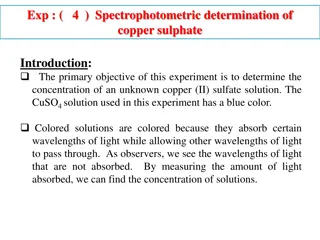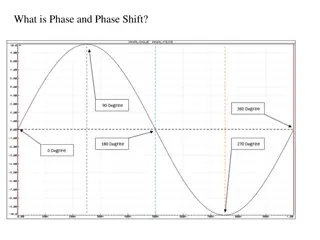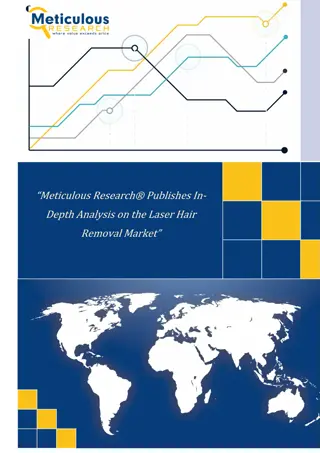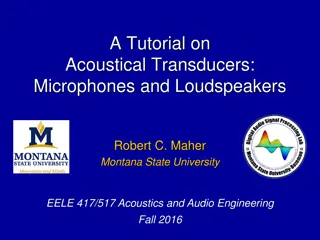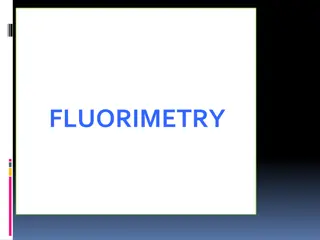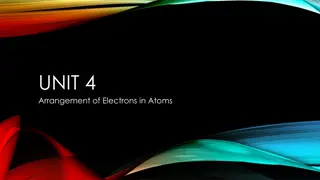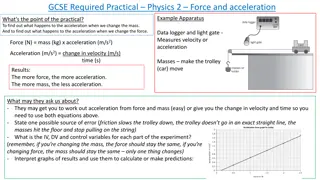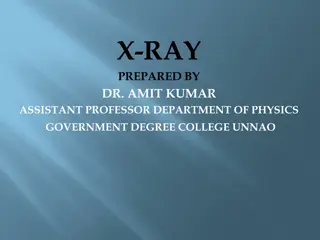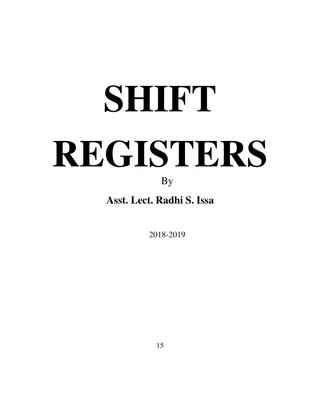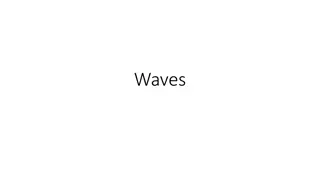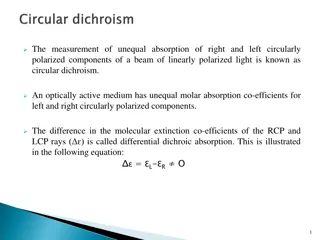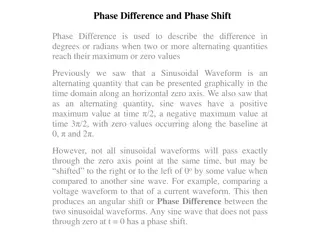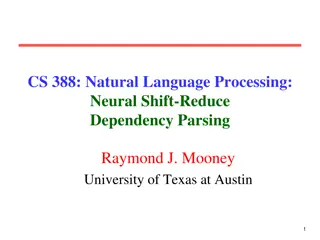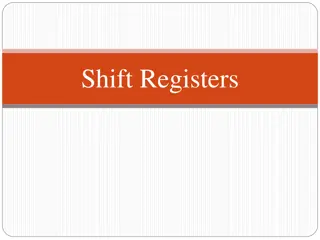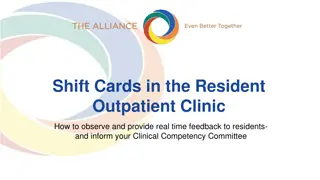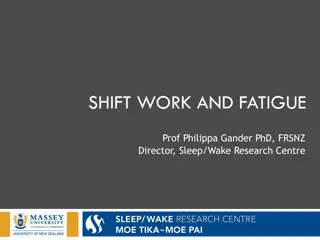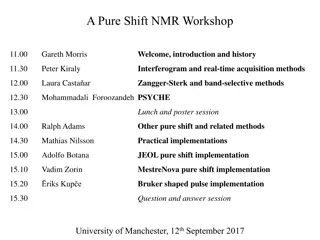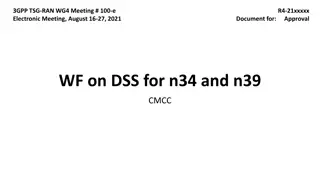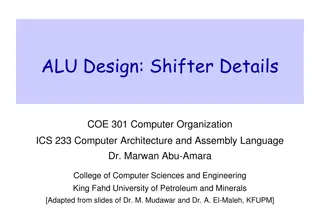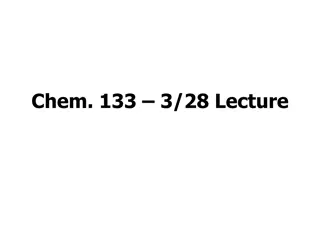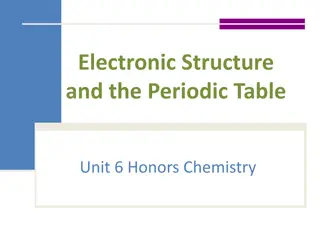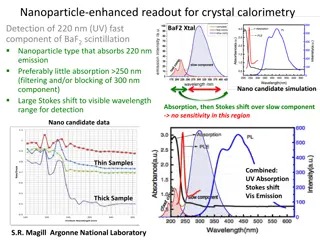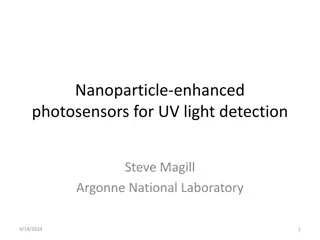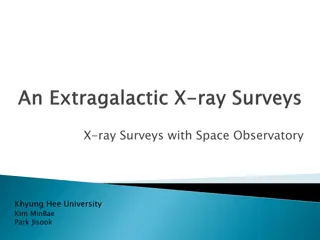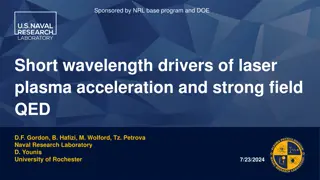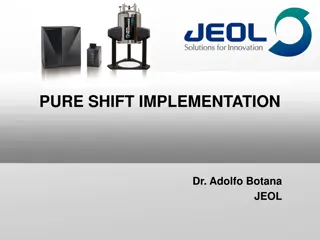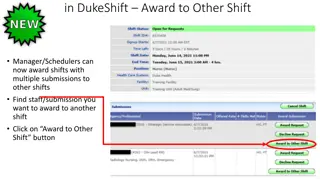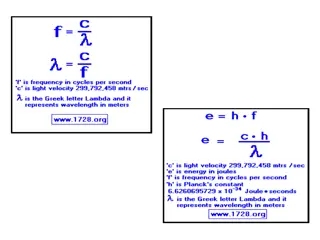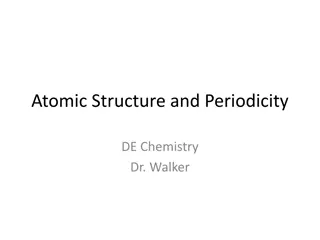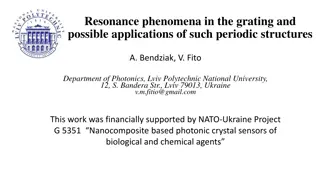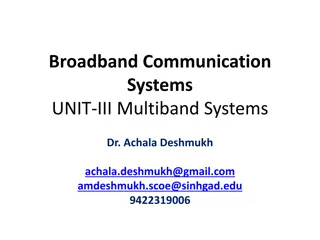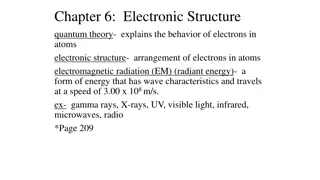Understanding Waves, Light, & Sound: Vocabulary and Concepts
This chapter covers essential vocabulary and concepts related to waves, light, and sound, including amplitude, crest, diffraction, Doppler effect, electromagnetic wave, frequency, interference, longitudinal wave, mechanical wave, medium, photon, pitch, reflection, refraction, sound wave, standing wa
8 views • 21 slides
Spectrophotometric Determination of Copper Sulfate Concentration
The experiment aims to determine the concentration of an unknown copper (II) sulfate solution by measuring light absorption at different wavelengths. Colored solutions absorb specific light wavelengths and appear colored to our eyes. By creating a calibration curve and following Beer's Law, the conc
3 views • 8 slides
The Shift from Government to Governance
This presentation discusses the transition from government to governance in public administration, exploring the concepts of public governance and the shift in decision-making processes. It covers the definition of public governance, the key differences between government and governance, and the imp
0 views • 8 slides
Understanding RC Phase Shift Oscillators
Dive into the world of RC phase shift oscillators, exploring the concepts of phase and phase shift in electronic circuits. Learn how cascading RC networks can achieve specific phase shifts, the role of impedance, and the practical applications of RC feedback networks in oscillator circuits. Discover
0 views • 18 slides
Meticulous Research® Publishes In-Depth Analysis on the Laser Hair Removal Market
Laser Hair Removal Market Size, Share, Forecast, & Trends Analysis by product (Diode, Nd:YAG, Alexandrite), Wavelength (Multiple, Specific Standard), End User (Hospitals, Dermatology Clinics, Beauty Clinics, Home Setting), Sex - Global Forecast to 2031\n
0 views • 4 slides
Pedagogical Shift in Physical Science: Constructing Knowledge Through Learner-Centered Experiences
There is a significant pedagogical shift in physical science education from viewing science as a fixed body of knowledge to emphasizing the process of constructing knowledge. Learners are now placed at the center stage, engaging in inquiry-based learning, critical thinking, and collaborative interac
3 views • 21 slides
Understanding Acoustical Transducers: Microphones and Loudspeakers
This tutorial explores acoustical transducers, focusing on microphones and loudspeakers. It covers transduction, principles of microphones and loudspeakers, as well as acoustics and psychoacoustics. Also discussed are the basics of sound, sound propagation, and the relationship between wavelength an
0 views • 33 slides
Understanding Fluorimetry: Principles and Applications
Fluorimetry is the measurement of fluorescence intensity at a specific wavelength using instruments like filter fluorimeters. It involves the excitation of molecules by radiation, causing electron promotion and emission of radiation. This process includes states like singlet and triplet, with relaxa
3 views • 45 slides
Shift of the Church: Eastward Expansion Through History
The Asian Church is witnessing a significant shift in influence from the West to the Majority World, marking a transformative phase in modern mission movements. With historical milestones like the Roman Catholic presence established in 1493 and the Protestant movement beginning in 1705 through figur
0 views • 12 slides
Understanding Electromagnetic Radiation and its Properties
This educational content delves into the arrangement of electrons in atoms, focusing on the properties of light and the electromagnetic spectrum, including the visible light spectrum. It explains wavelike behavior, wavelength, frequency, and their mathematical relationship, providing practice questi
0 views • 39 slides
Practical Physics Experiments for GCSE Force and Waves Concepts
Explore crucial GCSE physics practical experiments focusing on force, acceleration, extension of a spring, and wave properties in water and a solid. Understand the relationships between mass, force, acceleration, extension, frequency, wavelength, and wave speed through hands-on activities and data a
0 views • 5 slides
Understanding X-Ray Radiation: A Comprehensive Overview
X-ray radiation, discovered by Wilhelm Conrad Roentgen in 1895, is a high-energy electromagnetic radiation with a frequency range of 3.10^16Hz to 3.10^19Hz and a corresponding wavelength range from 0.01nm to 10nm. This form of radiation has applications in various fields, and its properties make it
0 views • 15 slides
Understanding Shift Registers in Digital Electronics
Shift registers are a fundamental concept in digital electronics where binary numbers are shifted from one flip-flop to the next. They come in various types like SISO, SIPO, PISO, and PIPO, serving different purposes such as delay lines, data converters, sequential memory, and ring counters. The ope
0 views • 10 slides
Understanding Waves: A Visual Exploration
Explore the fascinating world of waves through visually engaging images and interactive clickers. Learn about different types of waves, including longitudinal and transverse waves, and discover what waves carry - energy, not matter. Delve into the concepts of mechanical and electromagnetic waves, an
1 views • 37 slides
Optical Properties of Optically Active Compounds
Circular dichroism and optical rotatory dispersion are important techniques for studying the optical properties of optically active compounds. Circular dichroism measures the differential absorption of left and right circularly polarized light components, while optical rotatory dispersion studies th
0 views • 17 slides
Benefits of Vocantas Mobile App and Online Portal
Explore the benefits of using the Vocantas Mobile App and Online Portal, including easy installation on mobile devices, managing notifications, shift filtering, bidding on future shifts, receiving notifications on shift awards, adding shifts to your calendar, and more. The Online Portal offers featu
0 views • 9 slides
Understanding Phase Difference and Phase Shift in Sinusoidal Waveforms
Phase difference and phase shift describe the angular displacement of sinusoidal waveforms in degrees or radians. These concepts are crucial in analyzing the relationship between alternating quantities such as voltage and current. The phase angle determines the shift of a waveform along the horizont
1 views • 26 slides
Neural Shift-Reduce Dependency Parsing in Natural Language Processing
This content explores the concept of Shift-Reduce Dependency Parsing in the context of Natural Language Processing. It describes how a Shift-Reduce Parser incrementally builds a parse without backtracking, maintaining a buffer of input words and a stack of constructed constituents. The process invol
0 views • 34 slides
Understanding Shift Registers in Sequential Logic Circuits
Shift registers are sequential logic circuits used for storing digital data. They consist of interconnected flip-flops that shift data in a controlled manner. This article explores different types of shift registers such as Serial In - Serial Out, Serial In - Parallel Out, Parallel In - Serial Out,
2 views • 9 slides
Enhancing Resident Observations with Shift Cards in Outpatient Clinic
Explore the utility of Shift Cards in providing real-time feedback to residents in the outpatient clinic setting. Learn how to observe, provide feedback, and engage with the Clinical Competency Committee effectively using this innovative tool. Discover the benefits, learning objectives, and audience
0 views • 16 slides
Simplifying Residency Shift Scheduling with Mathematical Programming Techniques
This project, led by Professor Amy Cohn and William Pozehl, aims to demonstrate how mathematical programming techniques can simplify the complex task of residency shift scheduling. The Residency Shift Scheduling Game highlights the challenges of manual scheduling and the ease of using mathematical p
1 views • 37 slides
The Great Vowel Shift: A Linguistic Evolution
The Great Vowel Shift was a significant phonological transformation in the English language during the 15th to 17th centuries that altered the pronunciation of long vowel sounds. This shift, marked by a movement of vowel sounds to higher and more forward positions in the mouth, shaped the transition
3 views • 11 slides
Managing Fatigue and Shift Work: Impact on Safety and Wellbeing
Understanding the legal requirements, effects of fatigue and shift work, and ways to manage fatigue is crucial for ensuring workplace safety and employee wellbeing. Fatigue, a state of reduced performance capability, can result from various factors, including sleep loss and workload. Shift work pose
6 views • 19 slides
Pure Shift NMR Workshop: Advancements and Insights
Explore the latest developments and insights in Pure Shift NMR spectroscopy through presentations on acquisition methods, implementations, and the quest for spectral purity. Discover the evolution of magnet development and the potential of high-temperature superconductivity in NMR technology. Delve
2 views • 27 slides
Discussion on UL 7.5kHz Frequency Shift for n34 and n39 in 3GPP TSG-RAN WG4 Meeting #100-e
The approval document for Working Group on Dual-Site Selection (DSS) for n34 and n39 in CMCC, discussed in the 3GPP TSG-RAN WG4 Meeting #100-e, addresses the UL 7.5kHz shift agreements for different releases. The document outlines the mandatory nature of the shift for n34 and n39 in later releases,
3 views • 4 slides
Design and Implementation of Shifters in ALU for Single-Cycle Processors
The detailed discussion covers the construction of a multifunction Arithmetic Logic Unit (ALU) for computer processors, specifically focusing on the design and implementation of shifters. Shift operations such as SLL, SRL, SRA, and ROR are explained, with insights into shifting processes and data ex
0 views • 5 slides
Supporting Heroes in Mental Health Foundational Training (SHIFT)
SHIFT is a foundational training program funded by the Department of Justice, OJJDP, aimed at addressing the long-term effects of chronic exposure to traumatic material. The program focuses on supporting, educating, and empowering individuals in the mental health field to mitigate negative effects a
8 views • 5 slides
Introduction to Spectroscopic Instrumentation and Monochromators
Today's lecture covers spectroscopic instrumentation with a focus on monochromators. It delves into the components and performance measures of spectrometers, including wavelength discrimination filters, light detectors, and energy dispersive detectors. The dispersion of light through prisms and grat
0 views • 17 slides
Understanding the Wave Theory of Light and Electromagnetic Spectrum
Explore the fascinating world of electromagnetic waves, visible light, and the wave theory through concepts such as wavelength, frequency, amplitude, and the speed of light. Understand how these elements are interconnected, and discover the diverse range of the electromagnetic spectrum. Dive into th
0 views • 77 slides
Nanoparticle-Enhanced Readout for Crystal Calorimetry: BaF2 Scintillation Detection
Nanoparticles with specific absorption and emission properties are explored to enhance the readout process for BaF2 crystal calorimetry, focusing on detecting the fast 220nm UV component. The goal is to achieve a large Stokes shift to the visible wavelength range for efficient detection, while minim
0 views • 7 slides
Advances in Nanoparticle-Enhanced Photosensors for UV Light Detection and Quantum Confinement Research
Nanoparticle-enhanced photosensors are being developed by Steve Magill at Argonne National Laboratory for UV light detection, utilizing quantum confinement to enhance electronic and optical properties. Quantum confinement creates discrete energy levels in nanoparticles smaller than the electron wave
0 views • 30 slides
Exploring the Universe: X-Ray Surveys with Space Observatory
Delve into the fascinating world of X-ray surveys conducted by the Space Observatory at Khyung Hee University. Learn about the significance of X-ray surveys in detecting emission from hot regions of the Universe, minimizing errors in redshift measurements, extending the sample to higher redshifts, a
0 views • 16 slides
Advances in Laser Plasma Acceleration and Strong Field QED Research
Exciting advancements in laser plasma acceleration using short wavelength drivers and strong field QED research are being made, with studies involving excimer lasers, electron beam pumping, and high-power amplifiers. Techniques like excimer multiplexing are explored for multi-stage laser wakefield a
1 views • 24 slides
Pure Shift Implementation by Dr. Adolfo Botana - JEOL Image Gallery
Explore a collection of images showcasing the Pure Shift Implementation by Dr. Adolfo Botana at JEOL. Dive into the basics, experiment submissions, proton vs. pure shift comparisons, processing techniques, pulse sequence coding, and more. Witness innovative processing methods and cutting-edge techno
0 views • 17 slides
Efficient Shift Award Management in DukeShift System
DukeShift system allows Shift Managers/Schedulers to award shifts to staff members across different shifts. The process involves selecting staff submissions, choosing alternative shifts, ensuring correct dates, adding notes, and completing the award. For any questions, contact APIResourceGroup@duke.
0 views • 11 slides
Practice Problems on Wavelength, Frequency, and Energy
Solve problems relating to wavelength, frequency, and energy of electromagnetic waves. Calculate frequencies, wavelengths, and energies of light in various spectra including violet light and microwave radiation. Understand the relationship between wavelength, frequency, and energy in different scena
1 views • 7 slides
Understanding Electromagnetic Radiation and Quantum Energy in Chemistry
Delve into the fundamentals of atomic structure, periodicity, and electromagnetic radiation in chemistry. Explore the concepts of wavelength, frequency, speed of light, and quantum energy. Learn about important terms, example problems, Max Planck's contributions, and the photoelectric effect. Unrave
0 views • 67 slides
Resonance Phenomena in Grating Structures and Applications
Resonance phenomena in grating structures, such as dielectric or metal gratings on substrates, offer sensitive elements for detecting biological and chemical agents. The sensitivity of these structures is described by equations relating to resonant wavelength changes and the refractive index of inve
0 views • 20 slides
Understanding Multiband Systems in Broadband Communication
Explore the world of Wavelength Division Multiplexing (WDM) and its components, including fiber couplers, isolators, circulators, multiplexers, and demultiplexers. Learn the benefits of WDM technology such as capacity upgrade, transparency, scalability, and wavelength routing. Discover how WDM, CWDM
0 views • 51 slides
Understanding Electronic Structure and Quantum Theory in Atoms
Electronic structure and quantum theory elucidate the behavior and arrangement of electrons in atoms, with a focus on electromagnetic radiation, wavelength, frequency, and the speed of light. The inverse relationship between frequency and wavelength is explored through practical examples involving r
0 views • 34 slides

